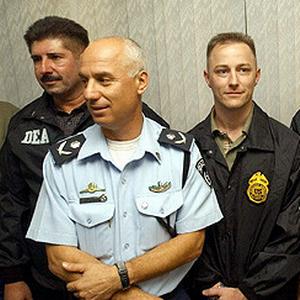Reputed Israeli mob boss appears
in U.S. court on drug chargesAn alleged Israeli mob boss made his first U.S. court appearance Tuesday following his extradition on charges of being involved in the distribution of more than 1 million Ecstasy pills in the United States.
Zeev Rosenstein, 51, did not enter a plea during a brief hearing before U.S. Magistrate Judge Barry Seltzer. A second hearing was set for March 28 for Rosenstein to enter a plea and to determine if he will be released on bail.
Benjamin Greenberg, the assistant U.S. attorney prosecuting the case, said the government will ask for no bail until trial on grounds that Rosenstein is a risk to flee and is "a danger to the community." For now, Rosenstein is being held in a special secure floor of the main federal detention center in downtown Miami.
Rosenstein's attorney, Howard Srebnick, said after the hearing that the government's case is built upon untrustworthy "snitches" who made incriminating statements about Rosenstein to gain reductions in their own criminal sentences. He said Rosenstein will plead not guilty.
"He's maintaining his innocence and we are going to get ready for trial," Srebnick told reporters. He said Rosenstein had a message in Hebrew for Israelis that translates into English as "This year a prisoner in Miami, next year a free man in Israel."
Federal authorities said Rosenstein was at the center of a drug distribution ring that spanned four continents, playing a key role in financing of the Ecstasy shipments and helping connect buyers and sellers.
Ecstasy, also known as MDMA, is a synthetic drug considered part hallucinogen and part amphetamine. It typically induces feelings of euphoria, increased energy and sexual arousal.
"Rosenstein has orchestrated the delivery of hundreds of thousands of Ecstasy tablets into American neighborhoods," said Karen Tandy, chief of the U.S. Drug Enforcement Administration. "Today, we answer his crime with the consequence criminals fear most: extradition to the United States."
U.S. Attorney R. Alexander Acosta of Miami said the five-year federal investigation of Rosenstein involved close cooperation with the Israeli National Police and the Tel Aviv district attorney's office.
Rosenstein, dressed in standard beige prison jumpsuit, said little during the hearing other than to answer the judge's questions that were translated into Hebrew.
Described by law enforcement authorities as one of Israel's leading organized crime figures, Rosenstein was flown to the United States from Israel on Monday to face the U.S. charges. Israel's Supreme Court had ruled in November that Rosenstein, who was arrested more than a year ago, could be extradited.
The U.S. extradition request alleged that Rosenstein was involved in the distribution of more than 1 million Ecstasy pills. The federal grand jury indictment, returned in 2004, charges Rosenstein with conspiracy to import and distribute illegal drugs from summer 1999 through November 2001. Each count carries a maximum prison term of 20 years.
Some of the Ecstasy was seized in an apartment in New York after they were offered for sale to an informant who worked for the New York Police Department and the DEA.
Rosenstein, also known as "The Fat Man" according to U.S. court documents, has largely escaped prosecution for his alleged crimes. Other than a five-year stretch in Israeli prison for armed robbery in the 1970s, he has eluded capture for his alleged drug trafficking and other illegal activities.
There have been at least seven attempts by others to kill Rosenstein, including a December 2003 bomb attack in Tel Aviv that killed three people and injured 18 others but left him unscathed.
HOMERefs
Global Ecstasy
Canadian Ecstasy
Ecstasy in the USA
Ecstasy and the Brain
Ecstasy news: ROAR against RAVE
Buying Research Chemicals Online
MDMA/Ecstasy: Utopian Pharmacology

